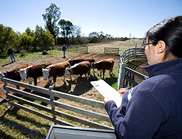CSIRO Livestock Industries scientist, Dr Caroline Lee, monitoring cattle behaviour at Armidale, NSW. (CSIRO)
CSIRO is researching ways to improve the welfare of livestock by developing scientific methods for assessing how animals 'feel' in response to common management practices.
The aim is to reduce stress and pain in livestock and increase not only their wellbeing but also their productivity.
“With increased public concern about the welfare of animals, and consumers seeking ‘animal welfare-friendly’ products, Australia’s livestock industries are focused on improving farming practices to meet changing expectations,” CSIRO scientist Dr. Caroline Lee said.
“It is also internationally recognised that we must quantify not only the biological cost but also the emotional cost of animals used for production of food and fibre.
“This requires new methods to benchmark the welfare of animals in their on-farm environment.”
The science of objective measurement of animal welfare is relatively new. Current methods largely focus on quantifying biological indicators of stress – for example, via blood tests that show changes in animals’ physiology or immune systems.
Studies of animal behavior have also been used to indicate obvious emotional states such as pain or discomfort, or preferences for different foods. However, all of these studies provide relatively limited information.
“Until now the major gap in our ability to assess animal welfare has been our capacity to understand the emotional states of animals in different farming situations, such as in intensive finishing systems or during droughts,” Dr. Lee said.
Based at CSIRO Livestock Industries' research facility near Armidale, NSW, Dr. Lee uses cognitive principles based on human psychological theories to assess animal emotions.
“The challenge is to gain insights – in a scientifically rigorous way – into how animals’ minds work,” she said.
“This will take some time to work through and it is one of key areas of strategic science undertaken by CLI’s Livestock Welfare Team.
“Ultimately, the outcomes of this research will expand on our understanding of emotional and cognitive functions of livestock and the impacts of farming practices on animal welfare.”
Provided by CSIRO




















